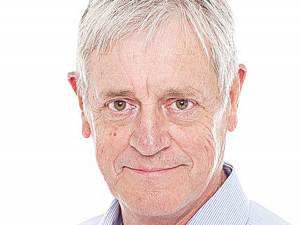DairyNZ chair wants cross-party deal
New DairyNZ chair Tracy Brown says bipartisan agreement among political parties on emissions pricing and freshwater regulations would greatly help farmers.
 Doug Edmeades asks why NZ farmers are about to be lumbered with a tax which he claims will not make a jot of difference to NZ GHG emissions.
Doug Edmeades asks why NZ farmers are about to be lumbered with a tax which he claims will not make a jot of difference to NZ GHG emissions.
OPINION: "We are all in this waka together” which, when translated, becomes “He Waka Eke Noa”.
What is in this waka is not immediately obvious, but I think it is to do with the gas methane. This fact, it seems to me, is easily lost in the tangle of words that surround the issue. So, let’s clarify.
Ruminants emit methane. Methane is a potent green house gas (GHG) which contributes to human-induced global warming (GW). New Zealand’s GHG emissions profile is dominated by methane coming from ruminants. In order to show that it is a good global citizen, NZ must do its best to curb the methane footprint.
Therefore, we must make the polluter – the farmer – pay. The costs are straightforward. Assuming that methane costs 11 cents per kg, then dairy farmers will need to cough about $6,200 per year and sheep/beef farmers $7,200. Should the cost of methane increase to say 35 cents then it will cost dairy farmers $20,000 and sheep & beef farmers $24,000 per year. Sounds fair and logical, yes?
But animals are carbon neutral. Indeed, if you were picky, you would say that they sequester (store) carbon in their leather and bones, but let’s leave that detail behind us. The carbon they emit as methane is balanced by the carbon they consume as carbohydrate from the pasture. Thus, if farmers are to be charged for their carbon emissions, they should be credited for the carbon they consume. He waka indeed!
And it gets worse. The amount of methane in the atmosphere derived from ruminants can only increase if the number of animals increases, but over the last 20-odd years the number of animals in New Zealand, expressed as stock units, has been effectively static; and as trends go, is likely to decline into the future.
In any case, New Zealand has about 1% of the world’s cattle and produces less than 3% of the world’s methane emissions from which it can be estimated that NZ’s agricultural industry produces 0.5% of the world’s methane. Trivial?
That’s at the macro, biological level. What about the micro, physical- chemistry level? The GHG effect arises because certain molecules (namely water, carbon dioxide, methane and nitrous oxide) absorb and emit energy. It just so happens that water vapour makes up about 90% of the GHG effect. Carbon dioxide is a bit player and methane and nitrous oxide are not even in the spectral orchestra!! At this mechanistic level, methane, when considered as a gas mixed with water and CO2, cannot have a significant GHG effect. Period?
So how come we are all in THIS waka? How come NZ farmers are about to be lumbered with a tax which will not make a jot of difference to NZ GHG emissions and hence man-induced global warming?
The United Nations launched this waka in 1988. They called it the International Panel on Climate Change (IPCC). They were specifically asked to explore the “scientific basis of the risks of human induced climate change.”
In other words, its brief was directional – they were not asked to identify all the reason(s) why the climate on earth fluctuated. Thus, it was that the waka set course, but as we are now realising, it has been headed off in the wrong direction!
Meanwhile, back on (Disney)land it was realised that the waka was headed for ETS rocks, so groups of otherwise ‘farmer-friendly’ sailors leapt on board. They made a world of difference – rather than a straight-out tax on farmers via the ETS we now have a straight-out tax on farmers called He Waka Eke Noa!
What can be done to change the direction of the waka? Personally, I think this waka is doomed.
At some time in the future, it will be wrecked on the rocks of sound science and logic. This will occur when the overwhelming cost of fiddling with human emissions of carbon dioxide and methane is fully realised and people start asking; what are we getting for this crippling tax?
Doug Edmeades is managing director of independent and scientific advice company to farmers agKnowledge Ltd
The Meat Industry Association of New Zealand (MIA) today announced that Chief Executive Officer Sirma Karapeeva has resigned from the role.
The winners of the 2026 Hawke’s Bay/Wairarapa Dairy Industry Awards were announced at the annual awards dinner held at Copthorne Solway Park in Masterton on Thursday evening.
Environment Southland is welcoming this week’s decision by the Environmental Protection Authority (EPA) to approve the release of Blaptea elguetai, a leaf‑feeding beetle that will help control the highly invasive Chilean flame creeper.
This March, the potato industry is proudly celebrating International Women’s Day on 8 March alongside the International Year of the Woman Farmer, recognising the vital role women play across every part of the sector — from paddocks and packhouses to research, leadership, and innovation.
Fruit trader Seeka posted a record profit and returns to shareholders in 2025.
Recent weather events in the Bay of Plenty, Gisborne/Tairawhiti, and Canterbury have been declared a medium-scale adverse event.

OPINION: A mate of yours truly reckons rural Manawatu families are the latest to suffer under what he calls the…
OPINION: If old Winston Peters thinks building trade relations with new nations, such as India, isn't a necessary investment in…